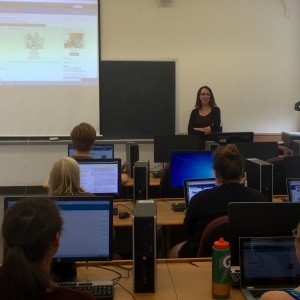We’ve gotten past the first two weeks of the semester – yay! From what I’m hearing many of you, it also means that you’re gearing your students up for some research projects.
Please remember that we at UST Libraries are here to help out! Each year we go into an average of 300 different classrooms to be another voice teaching students how to find and evaluate information and to make use of the Library’s services.
UST Librarians will work with you to make sure the session fits with your needs and expectations. Lower level courses are often geared towards more basic skills, while upper-level class sessions can help your students learn some of the research skills they will need as they prepare for graduate school.
Courses can take place in your classroom or one of the library’s computer labs and are taught using a mix of lecture and hands-on activities. We’re always happy to incorporate any library assignments you have for the day, and we can also build a course-specific subject guide (see examples here) that will include all of the resources/ideas covered in class (these can be embedded into Blackboard). After the session, librarians are available for follow-up sessions or individual consultations for both you and your students, as well.
We teach from the American Library Association’s Information Literacy Framework, and here are some ideas of what this involves:
- The “nuts and bolts” of using the library
- How to find things on the shelves
- Navigating the website
- Setting up RefWorks and ILLiad accounts – and why you’d need them
- How to construct a research strategy
- Brainstorming appropriate search terms
- Forming a research question
- Determining scope of search (choosing filters such as date, geography, etc)
- Where to locate information
- Finding the appropriate (electronic or paper) resources and services
- Determining the difference between sources
- Type of research: Primary v. Secondary
- Audience: Peer-Reviewed/Academic v. Professional v. Popular
- Familiarization with databases and journal titles important in their field
- Evaluate and synthesize the information discovered
- How to effectively read a research paper
- Determine the authority of the source
- Finding an “Academic Conversation” within their area of interest (searching by author, cited references, and more)
- Building an annotated bibliography
- Information Ethics
- How to navigate the world of copyright
- Importance of citation and some basic how-to’s for a variety of citation styles
- Effectively using citation management tools
If you have any questions, please let us know. Otherwise we look forward to working with your classes!
